Photograph; Carmen Farina reacts during a news conference, Monday, Dec. 30, 2013 at MS 51 in the Brooklyn borough of New York. Farina, a former teacher, principal and longtime advocate of early childhood education, will be the next leader of the nation’s largest public school system. (AP Photo/Mark Lennihan) | Associated Press
Introductory Essay By Betsy L. Angert | Originally Published at EmpathyEducates. December 30, 2013
Is it too soon? Might we presume that all Educators are created equal? Could it be that being a Teacher is no guarantee, indeed, if there ever is one? In life we live and learn or do we? Consider a friend who was not one in the end, and then ruminate on the recent news. NYC Schools Chancellor pick is Carmen Fariña. It is time for celebration, plenty will say and did. Perhaps that might be, but is it?
Think of when you have thought to commend a person, place, or position. Might it be as it has been for me, easy to fall into line with one-of-a-kind when we first become acquainted with an individual? A recommendation from someone whom we respect has influence. Consider the freshly appointed Chancellor of the New York City Schools. Diane Ravitch, an adviser to de Blasio’s transition team, said, “Carmen is a great choice. She is an experienced educator, she has sound values, she has the confidence of the mayor, and she knows the system. And she actually talks about the joy of learning!” That sounds good; it should, or could.…
Still, there remains that nagging thought. How often do we think s/he is just fine? Our views are aligned, that is until we discover that what we thought we believed isn’t? How many times have we seen or heard what exists only on the surface.
If you are as me, more than once you have trusted, and then you learned. Actions speak, even those that seem sweet. Stories tell…and perhaps, there are tales that matter more.
Many education-affiliated groups came out with tempered support for Fariña after Monday’s official announcement. Randi Weingarten, president of the American Federation of Teachers union, issued a short endorsement when asked about the appointment over email: “She is a fine educator.”
“Secretary Duncan looks forward to working with Mayor de Blasio, Chancellor Fariña and their team,” said Dorie Nolt, Secretary of Education Arne Duncan’s press secretary. Are these a sign that all will be fine?
Will we know in time? I will not bet a dime. It is too much of a chance. Rating and ranking for me are too risky. The only certainty I see is that you, Carmen or me is a mystery. Essentially, we are inconsistent, or as Social Scientists say we are predictably irrational!
Carmen Fariña’s past, present, or future affiliations cannot be predicted. No matter who we are, we are complex beings. We can appear Progressive and truly be, while being traditional, or conservative as well. Ponder our history personal, professional and political
Dwight D. Eisenhower called his Supreme Court appointments the “biggest damn fool mistake I ever made.” Richard Nixon unwittingly named the future liberal author of Roe v. Wade. George H.W. Bush’s choice now evokes a GOP grumble, “No more Souters!”
This can be good or bad. It could even be sad, or just different. Am I glad to read that Carmen Farina is the Chancellor? I know not. Only time will tell or perhaps you will tell me. For now, I will just wait and see, listen, and learn. That for me takes an eternity.
NYC Schools Chancellor Pick Carmen Fariña Leaves More Questions Than Answers
By Joy Resmovits| Originally Published at Huffington Post. December 30, 2013
NEW YORK — Standing in front of 20 fidgety kids in a middle school gymnasium Monday, New York City Mayor-elect Bill de Blasio (D) announced what he called “literally one of the most important decisions” he’d make as mayor: the appointment of longtime educator and one-time Bloomberg education deputyCarmen Fariña as chancellor of the nation’s largest public school system.
At a press conference at Brooklyn’s William Alexander Middle School, a school his two children attended, de Blasio called Fariña “a brilliant innovator and someone who knew how to bring people together.” He also heralded a new attitude and direction for the schools, stressing the importance of a relationship with parents and teachers that is less antagonistic than the polarization that marked his predecessor’s tenure.
“There are things that need to happen, but they need to happen with people — not to people,” Fariña said, summarizing her approach to education management in New York.
But the appointment leaves much up in the air: During the Monday press conference, de Blasio and Fariña declined to answer many specific questions about the fate of Bloomberg initiatives like charter school growth and teacher evaluations, and about how they would approach contract negotiations with the United Federation of Teachers.
After months of campaign promises, Farina only has two days between her appointment and the first day of her job. The quick turnaround means advocates and experts throughout the country are left to wonder whether — and how soon — the mayor and his new schools chief will be able to deliver on their progressive promises when tasked with the management of the city’s largest agency.
And there are broader challenges: Thirty-five percent of students don’t graduate on time. “I know what they’re against … testing, charter schools, networks, the current accountability system,” said Eric Nadelstern, a former Klein deputy chancellor who overlapped with Fariña. “I haven’t heard what the plan is to move the system forward proactively so it can be successful with those unsuccessful kids.”
De Blasio’s campaign railed against Bloomberg’s education reforms, so putting a former Bloomberg ally — albeit a critical one — back into the head position raised some eyebrows, and had others feeling hopeful.
“It’s interesting that she was the pick given that supposedly she was aligned with [Bloomberg schools chief] Joel Klein for so long,” said Nina Rees, president of the National Alliance for Public Charter Schools. “She has a different approach to testing and accountability, but the fact that she was with the previous administration and had overseen a number of layoffs and substantial changes is a positive sign in terms of not completely abandoning some of the reforms the previous administration had in place.”
Fariña grew up in Brooklyn, the daughter of two Spanish immigrants who spoke that language at home. At Monday’s press conference, she told a story of a postcard that her father, who she said had a third-grade education and taught her about the importance of education, received in the mail from her school. The postcard asked why Fariña never attended class, though she hadn’t been absent. When her father asked about the postcard, he was told that Fariña’s teacher couldn’t properly pronounce her last name, and Fariña didn’t respond to the name the teacher made up for her — so she was labeled absent.
“She absolutely made me invisible,” Fariña said. Then she addressed New York City parents, saying their cultures will be respected: “Your child will be spoken to by the name you gave her,” Fariña said. “We are going to communicate often, frequently and explicitly.” Though she said she will spend most of January reflecting, one change effective on her first day will be having the parent engagement office report directly to her, Fariña noted.
She spent 22 years as an elementary school teacher in Cobble Hill, and her reading curriculum was so popular officials asked her to expand it from grades two to nine, de Blasio said Monday. She became principal of PS 6 on the Upper East Side, a school that rose in the rankings under her leadership after she saw an 80 percent staff turnover in eight years.
In 2001, she was elected to lead Brooklyn’s school District 15 — that’s where she met de Blasio, who held his first elected office there as a school board member. “She focused on things that weren’t getting enough attention, like middle school,” he said. Since then, she has been his informal education adviser — always taking his calls when he needed something, de Blasio said. The mayor-elect added he was confident she could help alleviate some of the city’s major problems — not the least of which is that only 22 percent of high school graduates were found to be college-ready.
She later oversaw a cluster of schools known as Region 8, and then Klein tapped her to become the Department of Education’s chief academic officer. De Blasio praised her for raising $40 million to support supplementary school activities such as Saturday school and parent counseling in that position. Nadelstern said he remembers Fariña as outspoken — “outgoing, gregarious, certainly a presence in the room.”
A few years later, she left that high-profile job. “She didn’t want to continue policy she didn’t believe in,” de Blasio said. “She left the system and became a leading advocate.”
Fariña said she left under tough circumstances. “Working with teachers and principals directly was very important,” she said. But “at the point when the notion that they were not the major players in the system kind of got to be known and there was kind of a different feeling,” she knew she had to leave. Fariña added that she also wanted to spend more time with her husband, who had “given up a lot” for her career.
Many education-affiliated groups came out with tempered support for Fariña after Monday’s official announcement. Randi Weingarten, president of the American Federation of Teachers union, issued a short endorsement when asked about the appointment over email: “She is a fine educator.”
“Carmen is a real educator. She has a deep knowledge of schools and our system, and is on record criticizing Mayor Bloomberg’s focus on high-stakes testing,” Michael Mulgrew, president of the United Federation of Teachers, said in a statement.
Diane Ravitch, a former Bush education official who now works in opposition to a data-driven, accountability-focused reform agenda, also had praise. “Carmen is a great choice,” Ravitch, an adviser to de Blasio’s transition team, said. “She is an experienced educator, she has sound values, she has the confidence of the mayor, and she knows the system. And she actually talks about the joy of learning!”
“Secretary Duncan looks forward to working with Mayor de Blasio, Chancellor Fariña and their team,” said Dorie Nolt, U.S. Secretary of Education Arne Duncan’s press secretary. “He wants to do whatever he can to support continued progress for students in New York City.”
Already, the charter school sector is lobbying the just-appointed chancellor to protect their schools. “Now is not the time to slow the city’s charter growth and deny choices to parents,” Northeast Charter Schools Network President Bill Phelps said in a statement released before the announcement.
“I know Carmen well, and she is an educator who cares,” said Eva Moskowitz, founder of the high-profile Success Academy charter school chain. “Will she protect and expand public charter school options for families who need and are demanding them?”
Rees was similarly cautious. “The rest of the country has always looked to NYC as an example of vibrant and successful charter schools, and we hope that trend will continue,” she said. A few weeks ago, she wrote a letter asking de Blasio for a meeting, she added.
She hasn’t heard back yet.
CORRECTION: An earlier version of this article misstated the name of Moskowitz’s schools.
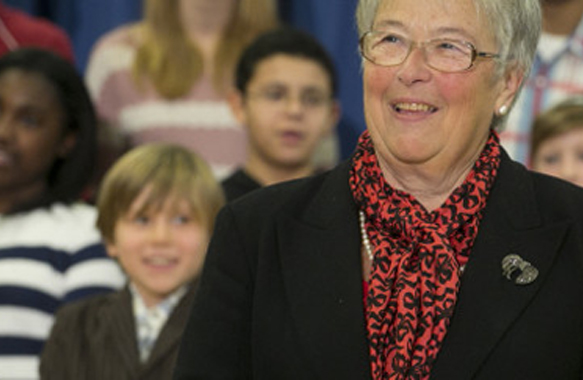
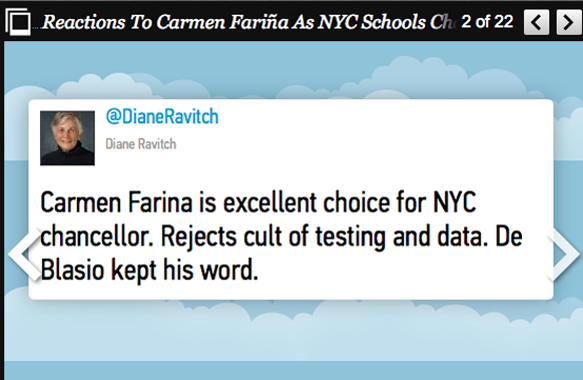

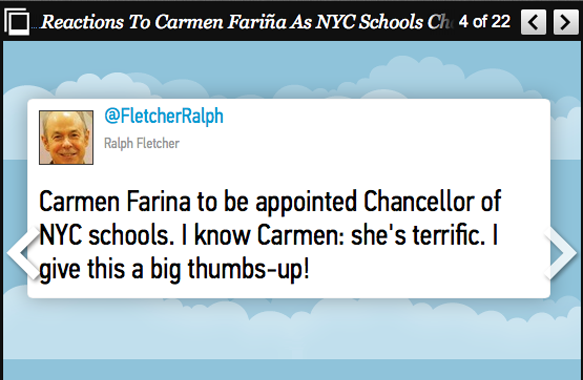


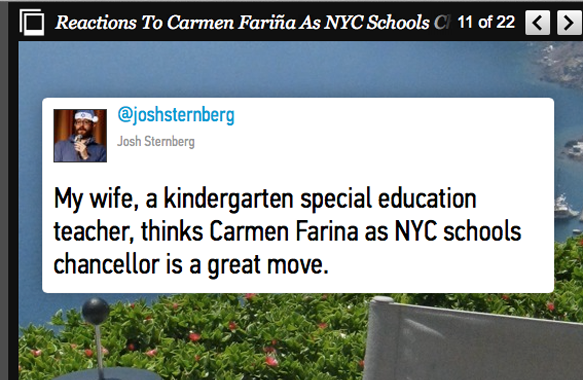


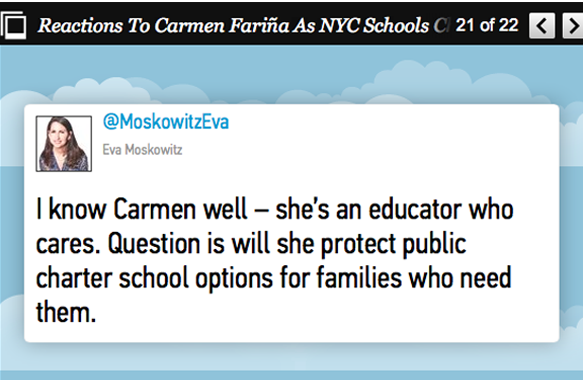

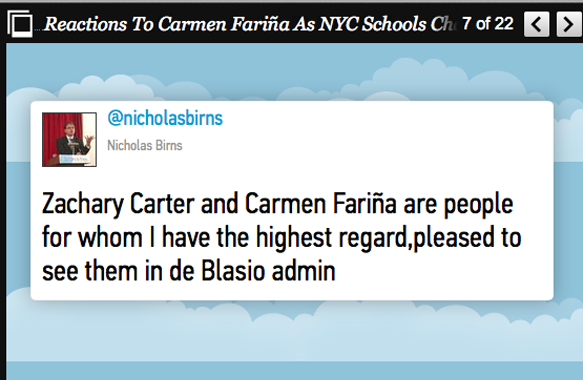
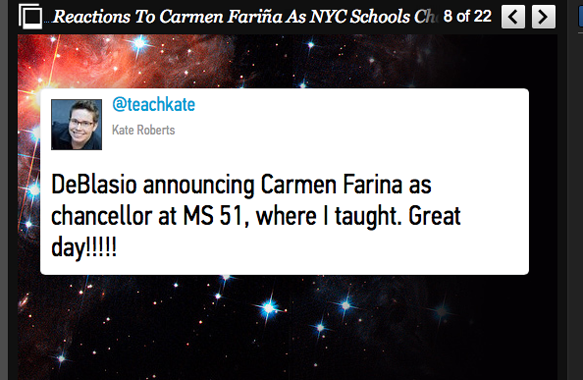
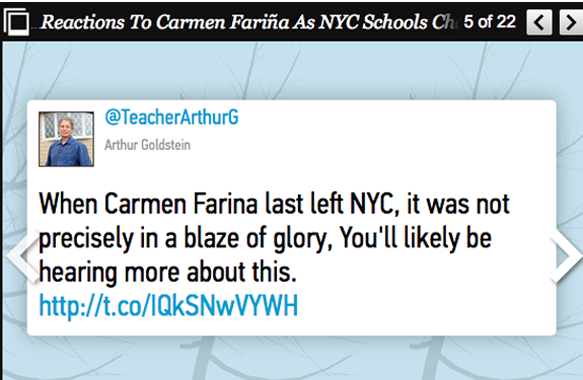
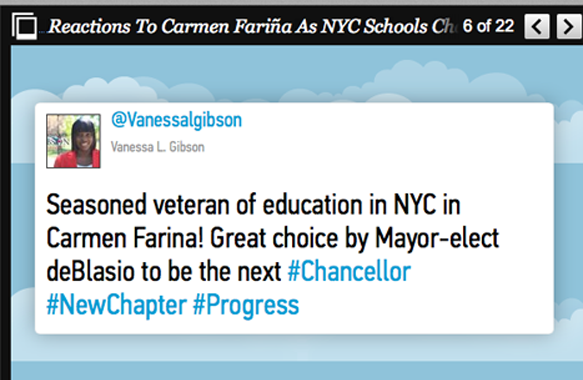
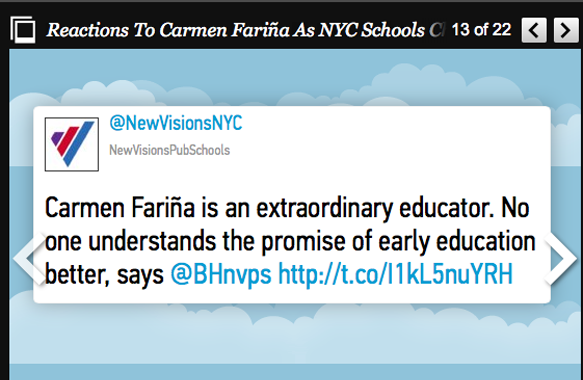
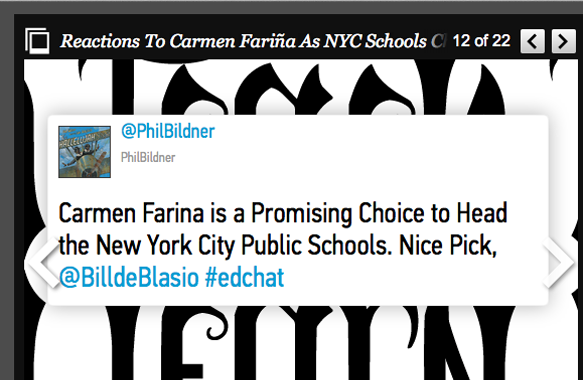











Leave A Comment